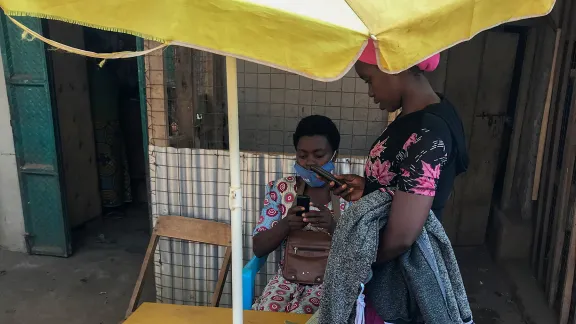
Vestina attending to a customer at her mobile money business in Kyangwali refugee settlement. Photo: LWF Uganda
LWF project in Uganda empowers refugees to be self-sustaining
(LWI) - “At times, I feel like I am dreaming. It is still hard to believe that my family can eat two meals a day, that we can buy what we need, and that I can educate my children. My God is a living God”, says Amal. The South Sudanese refugee has benefitted from an LWF project, which supports refugees in setting up a livelihood.
The two-year SALIMA (Safeguarding Lives with Integrated Multi-sector Assistance) project supports 250,000 refugees living in Adjumani, Kyangwali, Lamwo, and Palorinya settlements and vulnerable members of their host community. The project provides protection, water, sanitation, and hygiene (WASH), and livelihoods assistance. It targets single mothers and women, survivors of gender-based violence, and (foster) parents of large households who were entirely dependent on food rations before.
Amal has been living in Palabek refugee settlement, Uganda, since the South Sudanese civil war in 2013. LWF provided her with training and a cash grant to start a small business as part of a farmer group. Today, the 30-year-old single mother can provide for an extended family of seven.
A new start
The refugees have fled conflict in South Sudan and the Democratic Republic of Congo, often with only a few things they could carry. Their homes and everything in it have been destroyed. Living in Uganda means a new start . Through a combination of farmer groups, Village Loans and Savings Associations (VLSA), and specialized training, the refugees are able to generate income and to pool their saving, thus enabling one after another to set up a small business.
Amal became part of a farmer group. Through farming, she was able to save 500,000 Ugandan Shilling ($134). She used the money to buy sewing machines, material for school uniforms, and to pay the rent for her workshop.
Other women invested the money from their harvests into livestock like poultry, constructing a house, or setting up a small shop. The project is aligned with the Ugandan Settlement Transformation Agenda (STA), which focuses on promoting Self-Reliance and Resilience among Refugees and Host Communities.
Development and protection
The participants decide upon their future business after a training and assessment of skills and possibilities. “For one week, we learned about business management and selecting an enterprise,” says Vestina, a Congolese refugee living in the Kyangwali settlement in Western Uganda. “I had an interest in operating the mobile money business since it doesn’t require a separate office space.”
The Mobile Money Service is a popular alternative for banks in Africa, allowing users to store, send, and receive money using their mobile phones. One can also buy items in shops, pay bills, or withdraw cash at authorized agents. As a mobile money agent, Vestina receives a commission when customers use the service.
There is more than just the financial gain. Women benefit significantly from having more agency over household finances, LWF Uganda grants manager Heidi Lehto notes. “Given that denial of resources is among the most predominant types of gender-based violence in refugee households, the socio-economic impact of income-generating activities to women trickles down; mothers tend to prioritize children’s wellbeing,” she says. “We have seen an increasing trend of domestic economic abuse during the COVID-19 lockdown and are committed to safeguarding the most vulnerable by supporting them with skills and resources”, Lehto adds.
Realize their own potential
After less than a year, change is visible: many participants report that they are finally able to buy enough food and have been able to improve their diet. They use the money they generate from their businesses to pay for school fees and reinvest to grow a business. “We are surviving and steadily developing,” says Vestina, now a successful agent in the mobile money business.
We are not only surviving but also steadily developing.
Amal, who started with farming, and worked as a seamstress, now also owns a motorcycle and a shop for spare parts bicycles. During the COVID-19 pandemic, LWF and UNHCR contracted her to sew face masks for refugees in the Palabek settlement. Her income was high enough to send her children to a private school. “Without this project, I would not have realized what I am capable of today,” Amal says.
The project has been funded by the Bureau of Population, Refugees, and Migration (PRM). 250,000 refugees and their hosts have received assistance. Parts of the project focused on youth or on particularly vulnerable groups.
LWF in Uganda works with refugees and vulnerable communities, providing livelihoods, protection and quality services in refugee settlements and host communities of Adjumani, Moyo, Rwamwanja and Kyangwali.


